|
Here are all the paintings of Samuel Prout 01
| ID |
Painting |
Oil Pantings, Sorted from A to Z |
Painting Description |
| 28012 |
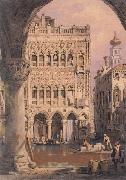 |
C'a d'Oro,Venice |
c 1830
Watercolour 43.2 x 30.5 cm
(17 x 12in)
Victoria and Albert Museum (mk63) |
| 26120 |
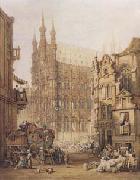 |
Hotel de Ville,Louvain (mk470 |
SPWC 1823
bt,G.Haldimand
Watercolour
1257x975mm
National Museums Liverpool,the Walker
|
| 26106 |
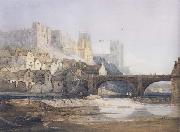 |
Part of Durham Bridge (mk47) |
1815
Watercolour
438x591mm
|
| 68897 |
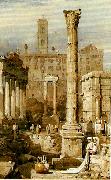 |
rome the forum |
1824 watercolour and gouache 42x26.6cm
se |
| 26127 |
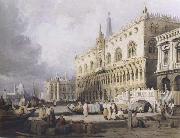 |
The Doge s Palace and the Grand Canal,Venice (mk47) |
c.1830
Watercolour
435x564mm
Trustees of the Royal Society of Painters in Watercolour
|
|
|
| Samuel Prout
|
| English Painter, 1783-1852
was an English water-colour painter. He was born at Plymouth, and spent whole summer days, in company with Benjamin Haydon, drawing the quiet cottages, rustic bridges and romantic watermills of the beautiful valleys of Devon. He made a journey through Cornwall to try his hand in furnishing sketches for Britton's Beauties of England. In 1803 he moved to London, where he stayed until 1812. In London, Prout saw new possibilities, and endeavoured to correct and improve his style by studying the works of the rising school of landscape. To earn a living, he painted marine pieces for Palser the printseller, took students, and published drawing books for learners. He was one of the first to use lithography in his artwork. It was not however until about 1818 that Prout discovered his niche. Happening time to make his first visit to the Continent, and to study the quaint streets and market-places of continental cities, he suddenly found himself in a new and enchanting province of art. His eye caught the picturesque features of the architecture, and his hand recorded them with skill. The composition of his drawings was exquisitely natural; their colour exhibited "the truest and happiest association in sun and shade"; the picturesque remnants of ancient architecture were rendered with the happiest breadth and largeness, with the heartiest perception and enjoyment of their time-worn ruggedness
|
|

